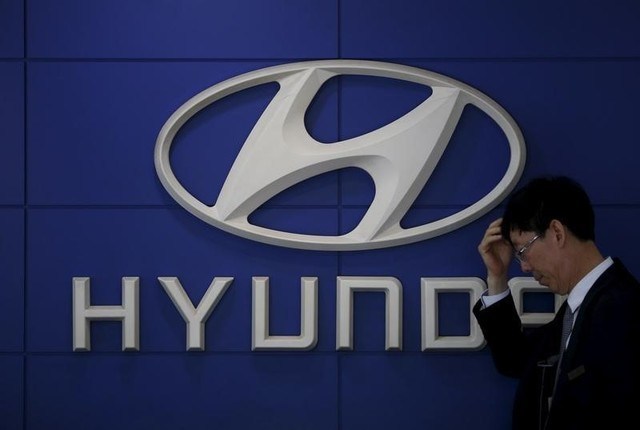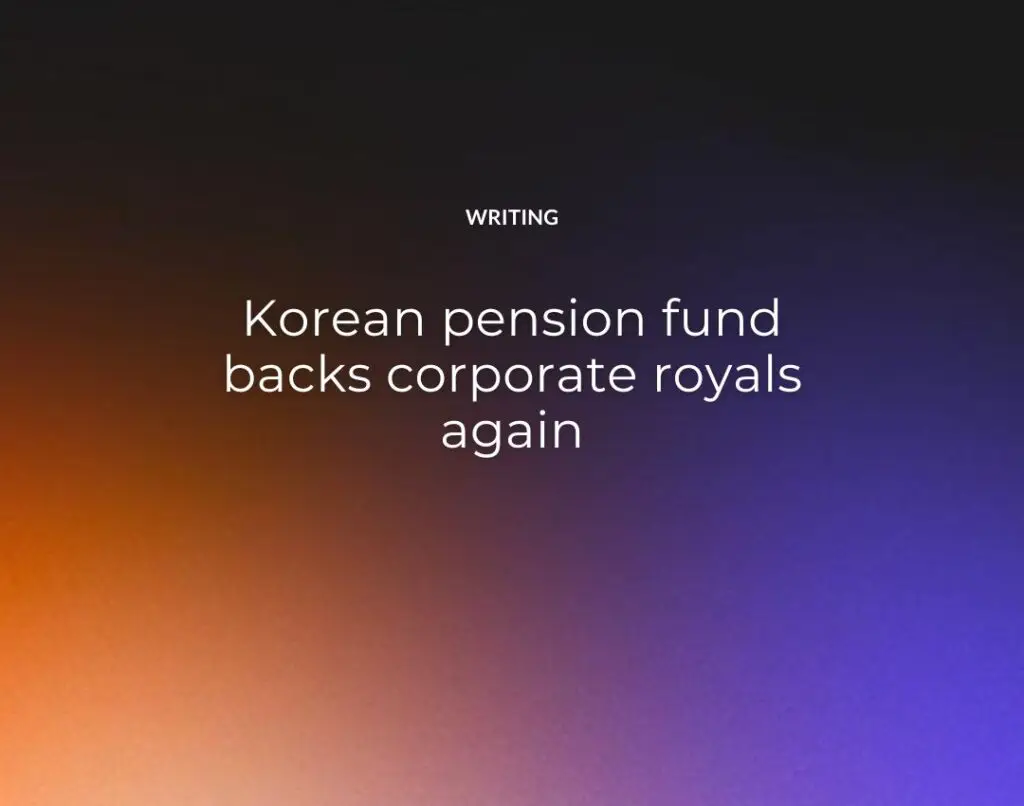By Geoffrey Cain
Asia Times
Mar 23, 2019
Huge pension body continues to protect troubled corporate dynasties, undermining reform efforts

When the future of one of the world’s most advanced economies and democratic success stories hangs in the balance, you wouldn’t think its pension officials would stand in the way of progress. But votes cast in shareholders’ meetings in Seoul today indicate that they are buttressing an all-powerful business status quo that presidents have been vowing to reform for decades.
As the third-largest sovereign pension fund in the world, managing a portfolio of more than $550 billion, South Korea’s National Pension Service (NPS) often casts the deciding shareholder vote in proposals by the chaebol, or family-run corporate empires like Samsung and Hyundai – and by extension, Korea Inc’s future.
The NPS owns from 5% to 10% of the largest chaebol affiliates, making it one of the most influential guarantors of South Korea’s economic health. Its mandate: To guard and grow the retirement savings of a rapidly aging population, which should give it a stake in improving the notoriously poor corporate governance of the companies it’s invested in
But on Friday March 22, the NPS revived its role as guardian of the country’s scandal-ridden chaebol when it voted in favor of all of Hyundai’s controversial proposals in two crucial shareholder meetings.
In doing so, it rejected proposals by activist hedge fund Elliott Management. These proposals included a demand for a $6 billion payout —Hyundai Motor Corp and affiliate Hyundai Mobis pay alarmingly low dividends, critical components of the so-called the “Korea Discount” — and for new directors who would act as a check on managerial excesses.
Prudent shareholders mighty reasonably mix their “yes” votes between some of Hyundai’s proposals and some of Elliott’s proposals, as shareholder advisory group Institutional Shareholder Service (ISS) recommended last week.
It seems less prudent to offer unwavering and total loyalty to Hyundai, as the NPS signaled in the vote on Friday. Favorable shareholder votes like these are paving the way for the conglomerate’s third generation of leaders to ascend to chairmanships, despite spotty records in business, and a notorious lack of transparency.
For decades, Korean fund managers have balked at “interfering in management.” Even so, you’d think the NPS would have learned its lesson by now.
Presidents fall, chairmen don’t
The last time the NPS acted friendly toward a chaebol, it set off a seismic sequence of events that concluded two years later in public furor, massive street protests, multiple arrests, and the downfall of the business and political establishment.
In summer 2015, the NPS voted – in murky circumstances – in favor of a vexing merger of two Samsung affiliates that would usher in the electronic giant’s third-generation heir, Vice Chairman Jay Y. Lee, as leader of the group.
The proposal to merge two affiliates in disparate industries made little business sense. The pension body predicted internally that it would lose money, but voted “yes” anyway, under pressure from politicians. Cozy mergers between two affiliates of the same chaebol group are usually not a business decision, but a troubled mechanism for passing control of public companies to family heirs who benefit from labyrinthine ownership structures.
For her role in the scandal, then-President Park Geun-hye was impeached, removed from office and sentenced to 24 (later extended to 33) years in prison. Although the scandal was multi-faceted, her extortion of millions of dollars from chaebol groups in exchange for political favors – like the NPS vote in favor of Samsung management – was the key element in her downfall.
Yet the party who benefited – Lee, Samsung’s third-generation heir – got a five-year sentence for bribery, embezzlement and perjury. A judge later reduced that to two and a half years. Then, after scarcely a year behind bars, he was released early from prison, even though the judge upheld part of his bribery conviction.
South Korea’s former Minister of Health and Welfare and the NPS’s Chief Investment Officer, meanwhile, were hauled off to prison cells in June 2017.
The NPS, battered and shamed, has since been subject to modest reforms under South Korea’s new president, Moon Jae-in.
Shareholders vs dynasties
The pension body adopted a promising stewardship code that was premised on careful decision-making and increased transparency. One plan was to name and shame company stocks it had invested in that would probably lose money.
So on Friday, all eyes were on the king-making NPS. By voting in the interests of Hyundai’s ruling dynasty, and not the future of its fund, it’s signaled to would-be chaebol leaders that the NPS has got their backs.
Like historic civil wars between monarchs and their parliaments, Hyundai’s heir, vice-chairman Chung Eui-sun, 48, needs the support of noisy shareholders who demand stronger checks and balances against dynastic abuse.
The NPS has every interest in exercising its shareholding authority against Hyundai. The company has been prone to waste and scandal, even while its core businesses have struggled and the national economy shows signs of trouble.
For instance, while Hyundai Motor sits on more than $12 billion in cash, in 2014 it bought property in Seoul’s swanky Gangnam district for $10 billion, three times the market value — money that could go on building better cars, better parts and better software.
That extraordinary purchase spooked shareholders. Hyundai’s stock tumbled.
Hyundai’s shareholder battle on March 22 was a testing ground, showing whether or not South Korea’s corporate governance reforms will hold up. Now we know the answer: Probably not.
In private, foreign and Korean investors say that they worry that the NPS stewardship code is self-regulating and not legally binding. They say the Moon administration’s reforms are built on wobbly legs and replete with mixed messages, after all, the presidential Blue House has chided the chaebol – but has also invited their heirs onto high-profile presidential tours (including to North Korea, during his summit with North Korean leader Kim Jong Un, last October). Now, the NPS has made clear its stance.
In 2018, the NPS posted the worst losses in its 32-year history. It’s under more pressure than ever to exercise its shareholding authority to demand stronger returns and better leadership of the companies it invests in. Instead, the NPS is signaling – yet again – that the chaebol heirs have a powerful protector.
Balking and effectively siding withthird-generation successions instills little confidence that Moon will be able to push through the kind of reforms necessary to pump innovation into South Korea’s economy with a churn of new blood and talent.
The article was originally published in Asia Times
See Also:






